Considering many premium AI solutions, the best AI chatbots for websites offer a far more accessible entry point into advanced automation.
These platforms are how most businesses will experience the latest breakthroughs in conversational AI, and they’ll likely be very impressed with the results. Our statistical blog mentioned that the chatbot market is forecasted to reach around $1.25 billion by 2025, according to data from Statista. If you find top-tier AI assistants, these chatbots provide a super great way to tap into cutting-edge AI technology.
The best AI-powered chatbots for websites in 2025 include:
- ChatGPT
- Google Gemini
- Claude
- Microsoft Copilot
- Intercom
- Drift
| Chatbot | Use Case | Starting Price | Free Plan |
| ChatGPT | Multi-purpose: writing, coding, creative support | $20/month | Yes |
| Google Gemini | Contextual AI integrated with Google services | $19.99/month | Yes |
| Claude | Context-aware conversation and deep research | $20/month | Yes |
| Microsoft Copilot | Voice-first interaction with creative modes and Microsoft 365 integration | $20/month | Yes |
| Intercom | Customer service automation and lead qualification | $39/month | No |
| Drift | Conversational marketing and sales enablement | Custom pricing | No |
ChatGPT – Best All-Around Conversational AI Chatbot
AI customer favorites like ChatGPT are gaining smarter reasoning and a more natural conversational style. Of course, ChatGPT has both good features and speed; more importantly, it can understand, respond, and interact in ways that are… quite genuinely human. ChatGPT is one of the best AI chatbots today.
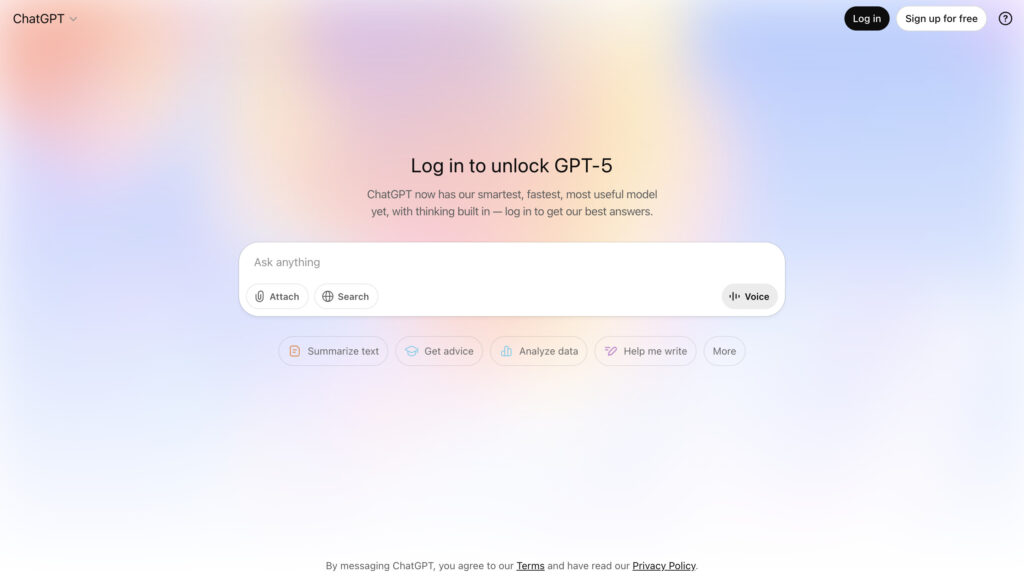
Use Case
ChatGPT is a conversational AI model trained specifically to engage users through natural, interactive dialogue.
Unlike many scripted chatbots, it can not only provide direct answers but also respond to follow-up questions and question or reject inappropriate requests. ChatGPT is super amazing at understanding and executing complex instructions, ideal for detailed, context-aware interactions.
Ease of Use
OpenAI has developed ChatGPT to be accessible and straightforward for both end users and developers. Its chat-based format allows users to interact naturally. You don’t even need to learn specialized commands or rigid input formats to use ChatGPT. Due to its conversational memory and understanding of context, users can continue discussions or ask for clarification.
From a developer perspective, ChatGPT’s integration is streamlined through APIs, enabling websites to embed this intelligent assistant reliably. Importantly, ChatGPT’s ability to admit errors and gently guide users away from unsupported requests makes the overall user experience quite transparent and trustworthy.
AI Capabilities
ChatGPT has just released the GPT‑5 model, OpenAI’s most advanced AI system to date. GPT‑5 offers state-of-the-art performance across a wide range of areas, including coding, writing, and visual perception.
Its unified system design incorporates a fast-response model for straightforward queries and a deeper reasoning model for more complex problems. ChatGPT is very useful for instruction following, writing, and technical problem-solving.
Scalability & Support
OpenAI supports ChatGPT across a spectrum of user needs through a subscription model. The Plus plan allows subscribers to enjoy higher usage limits and faster responses, and the Pro tier unlocks GPT‑5 Pro. ChatGPT uses a dynamic routing system that continuously improves by learning from user signals, such as response preferences and correctness metrics.
Google Gemini – Best for Powerful Conversational Design with Multimodal Capabilities
Compare Google Gemini to traditional search assistants, and its capabilities leave those simpler tools far behind. While it may not boast the hyper-conversational tone of some competitors, Gemini more than makes up for it with its deep integration into Google’s ecosystem and its ability to handle text, images, code, and video. Stack it against other top AI chatbots, and Gemini is especially for users of Google services.
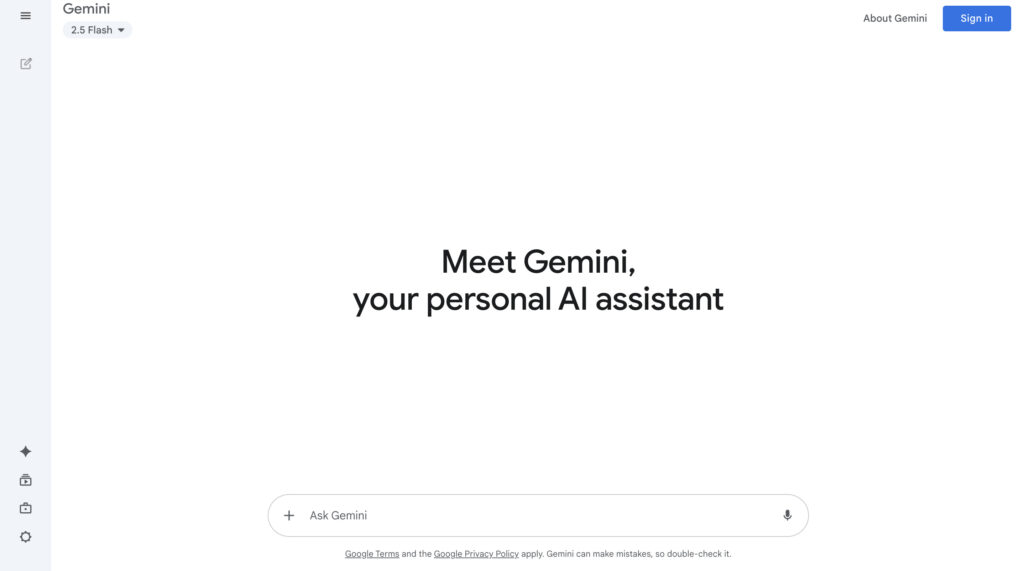
Use Case
There’s not much that Google Gemini can’t handle. Gemini began as an AI tool to enhance web search experiences but has rapidly grown into a tool capable of complex reasoning and file processing.
Its integration with Google services gives it an edge, whether it’s pulling context from Chrome or managing Gmail. Gemini’s ability to incorporate data from YouTube, Google Maps, and more means it can often deliver hyper-contextual and accurate responses.
Ease of Use
The Gemini interface is easy to use, featuring a “Ask Gemini” text field. Sign-in isn’t mandatory, but it unlocks advanced features, such as saving conversations and deeper research capabilities.
Gemini supports speech-to-text input and offers a separate voice mode called Gemini Live. It seems, though, that Gemini’s tone is more formal and less conversational than ChatGPT’s. Nevertheless, a large user group loves its directness and consistency.
AI Capabilities
Powered by the advanced 2.5 Flash model, Gemini attempts rational problem-solving. This model’s openness to real-time web access allows Gemini to cross-verify information and incorporate live data from Google’s ecosystem.
Gemini supports multimodal inputs and outputs – text, images, audio, code, and videos, which broadens its utility across creative, educational, and professional tasks. In addition, its direct access to Google’s extensive data sources enables more accurate and context-aware responses.
Scalability & Support
Gemini benefits from Google’s cloud infrastructure. It provides a flexible model that suits basic users and enterprise applications. Gemini doesn’t require an account for basic use, but by signing up, you can access enhanced features and personalization options.
Claude – Best for Safety and Privacy
It’s time to start thinking about Claude in the same way you’d consider ChatGPT or Google Gemini. Claude belongs in the same conversation as the top AI assistants with its privacy-focused design and reasoning abilities across coding and creative writing. Overall, Claude delivers a reliable and intelligent AI experience.
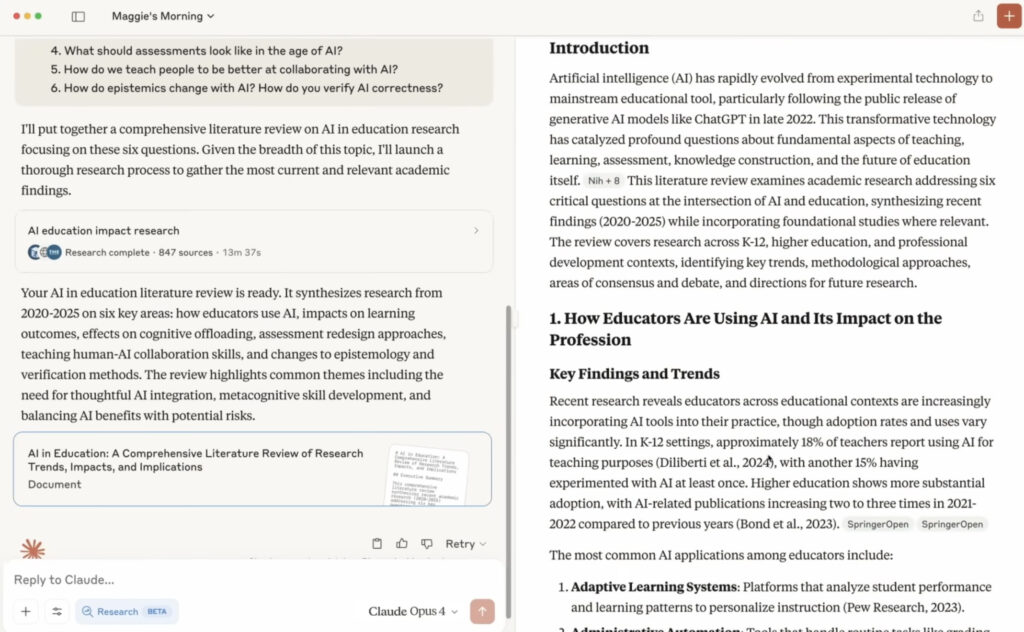
Use Case
Starting, Claude is built for safe, high-quality interactions. Now, it’s a great option as an AI chatbot that can handle anything from casual dialogue to complex problem-solving. Sonnet is for fast, conversational tasks, whereas Opus is for reasoning.
Claude’s strong privacy stance is a major selling point, ideal for businesses whose value is about user data protection. With its Advanced Research mode, Claude can now tap into web searches, your documents, and connected apps to produce thorough, citation-backed answers.
Ease of Use
Claude’s interface is clean and approachable, with an emphasis on clarity and conversational flow. It can ask clarifying questions, maintain long-term context, and integrate into workflows.
AI Capabilities
The Sonnet model provides quick, coherent responses for daily queries, and Opus supports tasks that require extended reasoning, such as scientific analysis. With the integrations feature, Claude can automate tasks in Jira or Zapier. Its text-based reasoning, adaptability, and integration capabilities keep it competitive with the very best AI chatbots.
Scalability & Support
Claude works well for both personal use and enterprise deployments. Its open-source Model Context Protocol makes integration across platforms and workflows straightforward. The platform’s API enables businesses to embed Claude directly into tools, websites, and apps, while its integration with Google Workspace and other services makes it more versatile.
Anthropic’s emphasis on safe AI development, privacy, and transparent improvement ensures Claude will remain a relevant and growing option.
Microsoft Copilot – Best for Enterprise-Grade and Microsoft Tool Integration
Many consider Microsoft Copilot an enterprise-grade AI assistant. With features like voice interactions and real-time contextual understanding, it’s clear that Copilot is designed thoughtfully, not just an afterthought.
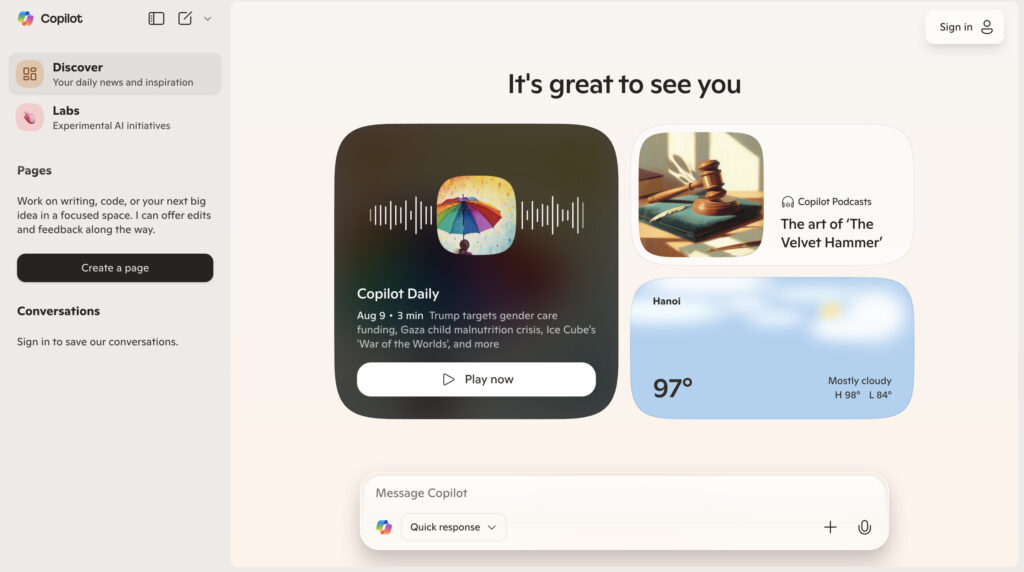
Use Case
Microsoft Copilot is a multimodal AI assistant that can give quick, accurate, and easy-to-read results. From generating summaries of daily events to delivering creative and precise answers with contextual links, it fits into workflows for businesses and customer support teams.
Copilot can handle natural voice conversations and present answers in a structured, readable format. Its ability to combine conversational AI with authoritative, verifiable information makes it especially effective for knowledge bases and interactive customer assistance.
Ease of Use
Copilot’s interface is approachable and thoughtfully built. Voice interaction is natural. The ability to click through to original sources directly from its answers keeps the experience transparent and interactive.
AI Capabilities
Copilot blends Microsoft’s large language model expertise with real-time contextual alignment that ensures responses adhere to Microsoft AI Principles. It all supports voice, text, and image inputs. Its natural language understanding is complemented by neural text-to-speech technology that delivers responses in a realistic, emotionally tuned voice. Copilot is equally adept at generating concise bullet-point lists or detailed reports.
Scalability & Support
Copilot is suitable for both individual and enterprise use, benefiting from Microsoft’s Azure backbone and integration with Microsoft 365, Teams, and Outlook. For websites, it can serve as a customer-facing chatbot or an internal productivity enhancer. Organizations can rely on Microsoft’s robust compliance and security framework for safe deployment.
Read more: The Best Tools for AI Meeting Summaries in 2025
Intercom – Best for Customer Support and Live Chat
The Intercom chatbot continues to offer one of the most customizable customer support interfaces around. Its Help Center design flexibility locks you into rigid templates, and Intercom holds its own when it comes to adapting the look and feel to your brand.

Use Case
Intercom is designed for businesses that seek a deeply integrated, brand-aligned support experience. Its customization tools let you match your Help Center’s appearance and behavior to your website or app.
Mobile compatibility is another strong point: its SDK allows your entire Help Center to live inside your mobile app, so customers never have to leave your ecosystem.
Ease of Use
Intercom’s interface is polished and versatile, but its advanced customization and setup options can take more time to master. Intercom offers plenty of resources to smooth the process, including guides and an active Community page. The ability to preview any UI changes before rolling them out is also helpful.
AI Capabilities
Intercom’s AI, including its Fin AI assistant, focuses on automating repetitive support tasks and providing quick, relevant answers to customer queries. While this chatbot may not match the conversational depth of general-purpose AI assistants, its precision within customer service contexts is amazing. Businesses can also integrate it with other tools to extend its functionality.
Scalability & Support
Intercom integrates with a wide range of customer service and marketing tools. It’s built for small businesses and enterprise-level deployments. Whether you need help configuring Fin AI or solving a unique workflow challenge, Intercom’s multi-channel support ecosystem ensures you’re not on your own.
Drift – Best for Sales and Marketing with Lead Qualification
Drift is a smarter choice for businesses looking to boost website conversions, thanks in part to its real-time personalized chat capabilities and seamless lead qualification.
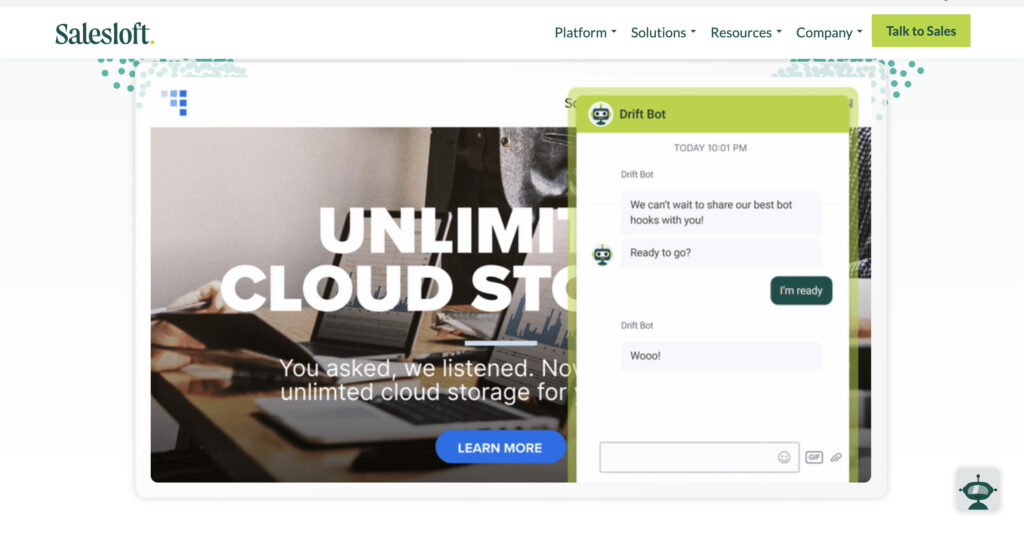
Use Case
Drift excels at converting website visitors into qualified leads by engaging them with real-time personalized conversations. Its chat agent handles instant answers, lead qualification, and meeting booking seamlessly. The platform also deanonymizes high-intent visitors, scores engagement live, and routes qualified prospects directly into sales workflows.
Ease of Use
Drift’s intuitive interface and integration with Gmail, Slack, and CRMs (Customer Relationship Management) make it straightforward for sales and marketing teams to adopt. Its daily usability streamlines lead qualification and customer engagement.
AI Capabilities
Drift’s AI-powered chatbots deliver meaningful, contextual conversations. Its automation extends across lead routing, personalized messaging, and 24/7 availability, enabling consistent engagement. Additionally, integration with multiple data sources ensures relevant, timely interactions.
Scalability & Support
Designed to support enterprises and mid-sized businesses, Drift scales with growing sales teams through seamless integrations and workflow automation. Continued investment in customization options, reporting, and training resources could further enhance its enterprise readiness.
Conclusion
If that’s not enough to convince you of their value. You really can’t beat the combination of flexibility, automation, and user engagement that these AI-powered chatbots bring. Throw in their scalability, constant updates, and ability to personalize interactions, and it’s hard to deny their impact on modern websites.
Expert opinion
When deploying AI, whether you focus on top-line growth or bottom-line profitability, start with the customer and work backward.

Rob Garf
Vice president and general manager, Salesforce Retail
Frequently Asked Questions





